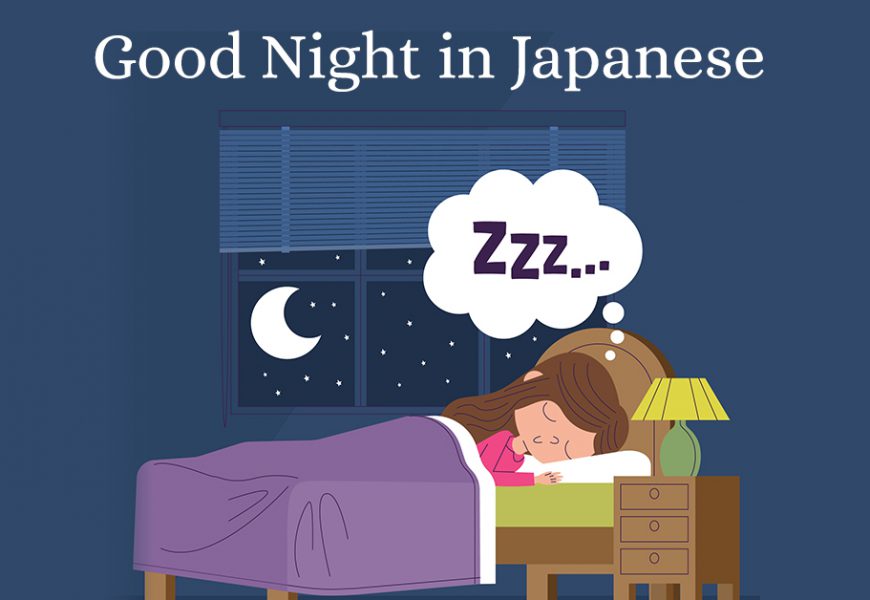Good night in japan language – Delving into the realm of “good night” in Japanese, we embark on a journey that unveils the intricate tapestry of Japanese culture and linguistic nuances. From formal greetings to casual expressions, this exploration unravels the etiquette, customs, and regional variations associated with bidding farewell in the Land of the Rising Sun.
As we delve deeper into the Japanese language, we will decipher the pronunciation and spelling of common phrases for “good night,” unraveling their grammatical structure and regional variations. This comprehensive guide illuminates the cultural significance of these expressions, providing insights into the Japanese way of life.
Introduction
Saying “good night” in Japanese culture is considered a polite and respectful way to end a conversation or interaction. It is a way of showing appreciation for the other person’s time and company and wishing them well for the night ahead.
There are several different ways to say “good night” in Japanese, each with its own subtle nuances and variations.
Different ways to say “good night” in Japanese
-
-*Oyasumi nasai (おやすみなさい)
This is the most common and formal way to say “good night” in Japanese. It is typically used in polite or formal settings, such as when speaking to an elder, a superior, or a stranger.
-*Oyasumi (おやすみ)
This is a more casual way to say “good night” and is often used among friends and family members.
-*Mata ne (またね)
This phrase literally means “until next time” and is often used as a way to say “good night” when you expect to see the person again soon.
-*Oyasumi kudasai (おやすみください)
This is a more polite way to say “good night” and is often used when you are leaving a conversation or interaction.
-*Oyasumi ga ohayō (おやすみがおはよう)
This is a playful way to say “good night” and literally means “may your good night be a good morning.”
Cultural Context

In Japanese culture, saying “good night” is a common and polite way to end a conversation or interaction. It is typically used in formal and informal settings, and the specific phrase used may vary depending on the context.
Etiquette and Customs
When saying “good night” in Japanese, it is important to be mindful of the following etiquette and customs:
- Use the appropriate phrase:There are several different phrases that can be used to say “good night” in Japanese, and the correct one to use will depend on the situation and the relationship between the speakers. For example, “oyasumi nasai” is a formal phrase that is typically used in polite settings, while “o yasumi” is a more casual phrase that is used among friends and family.
- Be respectful:When saying “good night” to someone who is older or in a position of authority, it is important to be respectful and use the appropriate honorifics. For example, you would say “oyasumi nasai” to a teacher or boss, but you would say “o yasumi” to a friend.
- Say it at the right time:“Good night” is typically said at the end of a conversation or interaction, when it is time to part ways. It is not appropriate to say “good night” in the middle of a conversation or when you are still planning to continue talking.
Language and Grammar
Japanese has several common phrases for “good night.” The pronunciation and spelling of these phrases vary depending on the context and formality of the situation.
The most common phrase for “good night” in Japanese is o-yasumi nasai(おやすみなさい). This phrase is typically used in formal settings or when speaking to someone who is older or of higher status. It is pronounced as “oh-yah-soo-mee-nah-sigh.”
Pronunciation and Spelling
- O-yasumi nasai(おやすみなさい): Pronounced as “oh-yah-soo-mee-nah-sigh.”
- O-yasumi(おやすみ): Pronounced as “oh-yah-soo-mee.”
- O-yasumi kudasai(おやすみください): Pronounced as “oh-yah-soo-mee-koo-dah-sigh.”
- O-yasumi ne(おやすみね): Pronounced as “oh-yah-soo-mee-neh.”
Grammar and Structure
The grammar and structure of Japanese phrases for “good night” are relatively simple. The most common phrase, o-yasumi nasai, is a combination of the verb yasumu(to rest) and the honorific suffix -nasai. The suffix -nasaiis used to express politeness and respect.
Other phrases for “good night” are also formed by combining the verb yasumuwith different suffixes. For example, the phrase o-yasumiis simply the verb yasumuwith the honorific suffix -o. The phrase o-yasumi kudasaiis the verb yasumuwith the honorific suffix -kudasai, which is used to make a request.
Regional Variations
/goodnight-58add0ac3df78c345bde4bb2.png)
The way to say “good night” in Japan varies depending on the region. The most common phrase is “oyasumi nasai” (おやすみなさい), which is used throughout the country. However, there are several regional variations that are worth noting.
Northern Japan
In the northern part of Japan, such as Hokkaido and Tohoku, it is common to say “ohayo” (おやす) instead of “oyasumi nasai”. This is a more casual way of saying good night, and it is often used among friends and family.
Western Japan
In the western part of Japan, such as Kansai and Chugoku, it is common to say “oban” (おばん) instead of “oyasumi nasai”. This is also a more casual way of saying good night, and it is often used among friends and family.
Southern Japan
In the southern part of Japan, such as Kyushu and Okinawa, it is common to say “ojama” (おじゃま) instead of “oyasumi nasai”. This is a more polite way of saying good night, and it is often used when speaking to someone who is older or of higher status.
Cultural Differences
The different ways of saying “good night” in Japan reflect the cultural differences between the different regions of the country. The more casual phrases, such as “ohayo” and “oban”, are more common in areas where there is a strong sense of community and familiarity.
The more polite phrases, such as “ojama”, are more common in areas where there is a greater emphasis on hierarchy and respect.
Formal and Informal Usage
In Japanese, there are both formal and informal ways to say “good night.” The choice of which to use depends on the situation and the relationship between the speakers.
The formal way to say “good night” is “oyasumi nasai” (おやすみなさい). This phrase is typically used in formal settings, such as when speaking to a superior or to someone you do not know well. It can also be used in informal settings, but it is considered to be more polite than the informal way of saying “good night.”
The informal way to say “good night” is “oyasumi” (おやすみ). This phrase is typically used in informal settings, such as when speaking to friends or family. It is also considered to be more casual than the formal way of saying “good night.”
Appropriate Usage
The following are some guidelines for when to use the formal and informal ways of saying “good night”:
- Use “oyasumi nasai” when speaking to a superior, to someone you do not know well, or in a formal setting.
- Use “oyasumi” when speaking to friends, family, or in an informal setting.
Literary and Artistic Expressions: Good Night In Japan Language
The Japanese phrase “good night” has been used in various forms of literature, poetry, and art throughout Japanese history. It has been employed to convey a wide range of emotions and create vivid imagery.
In Japanese literature, the phrase “good night” often appears in works that explore themes of separation, longing, and the passage of time. For example, in the classic novel “The Tale of Genji” by Murasaki Shikibu, the phrase is used to mark the end of a romantic encounter, evoking a sense of bittersweet longing.
Poetry, Good night in japan language
In Japanese poetry, the phrase “good night” has been used to create evocative imagery and convey emotions such as loneliness, nostalgia, and the ephemeral nature of life. For example, in the haiku poem by Matsuo Bashō:
Furuike yaKawazu tobikomu Mizu no oto
Translation: An ancient pond A frog jumps into the water The sound of water
The phrase “good night” is not explicitly mentioned in this poem, but the image of the frog jumping into the water suggests a sense of tranquility and the passing of time, evoking a similar emotion to that of saying “good night.”
Ultimate Conclusion

In conclusion, our exploration of “good night” in Japanese has shed light on the multifaceted nature of Japanese culture and language. Whether in formal or informal settings, the nuances of these expressions reflect the deep-rooted customs and traditions of Japan.
By embracing these linguistic intricacies, we gain a deeper appreciation for the beauty and diversity of the Japanese language and culture.
Question & Answer Hub
What is the most common way to say “good night” in Japanese?
The most common way to say “good night” in Japanese is “おやすみなさい” (oyasumi nasai).
Is it considered rude to say “good night” in Japanese to someone you don’t know well?
No, it is not considered rude to say “good night” in Japanese to someone you don’t know well. However, it is important to use the appropriate level of formality depending on the situation.
Are there any regional variations in how “good night” is said in Japan?
Yes, there are some regional variations in how “good night” is said in Japan. For example, in the Kansai region, people often say “おやす” (oyasu) instead of “おやすみなさい” (oyasumi nasai).